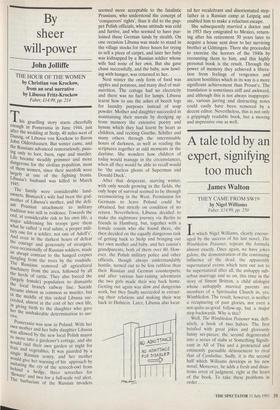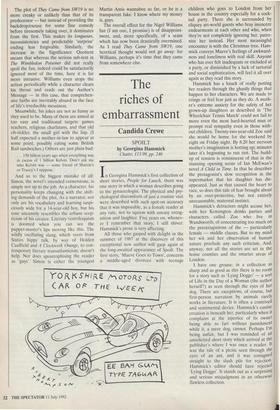A tale told by an expert, signifying too much
James Walton
THEY CAME FROM SW19 by Nigel Williams Faber, £14.99, pp. 250 In which Nigel Williams, clearly encour- aged by the success of his last novel, The Wimbledon Poisoner, repeats the formula almost exactly. Once again, we have jokes galore, the demonstration of the continuing influence of the dead, the apparently supernatural events which turn out not to be supernatural after all, the unhappy sub- urban marriage and so on, this time in the story of Simon Britton, a child ufologist whose unhappily married parents are members of a Spiritualist Church in, yes, Wimbledon. The result, however, is neither a recapturing of past glories, nor even a not-quite-as-good follow-up, but a major step backwards. Why is this?
Well, The Wimbledon Poisoner was, defi- nitely, a book of two halves. The first bristled with great jokes and gloriously funny set-pieces; the second degenerated into a series of stabs at Something Signifi- cant in All of This and a protracted and eminently guessable denouement to rival that of Cymbeline. Sadly, it is the second half which Williams develops in his new novel. Moreover, he adds a fresh and disas- trous error of judgment, right at the heart of the book. To take these problems in order ...
The plot of They Came from SW19 is no more creaky or unlikely than that of its predecessor — but instead of providing the backdrop/excuse for some fine comedy before tiresomely taking over, it dominates from the first. This makes its longueurs, inconsistencies and predictable 'surprise' ending less forgivable. Similarly, the increase in the Significance Quotient means that whereas the serious sub-text in The Wimbledon Poisoner did not really spoil the fun, indeed could be satisfactorily ignored most of the time, here it is far more intrusive. Williams even stops the action periodically while a character clears his throat and reads out the Author's Message — in this case, that comprehen- sive faiths are inevitably absurd in the face of life's irreducible messiness.
Meanwhile, his jokes are not as funny as they used to be. Many of them are aimed at too easy and traditional targets: games teachers, religious charlatans, and that old rib-tickler, the small girl with the lisp. (I half expected a mother-in-law to appear at some point, possibly eating some British Rail sandwiches.) Others are just plain bad: ... 150 billion years ago when everything was in excess of 1 billion Kelvin. Don't ask me who Kelvin was — some friend of Sharon's or Tracey's 1 suppose.
And so to the biggest mistake of all: Simon, the novel's intended cornerstone, is simply not up to the job. As a character, his personality keeps changing with the shift- ing demands of the plot. As a narrator, not only are his vocabulary and learning suspi- ciously wide for a 14-year-old boy, but his tone uncannily resembles the urbane scep- ticism of his creator. Literary ventriloquism is doomed when you can see the puppet-master's lips moving like this. The wildly oscillating slang, which veers from Sixties hippy talk, by way of Holden Caulfield and A Clockwork Orange, to con- temporary literary transatlanticism, doesn't help. Nor does apostrophising the reader as 'guys'. Simon is either the youngest
Martin Amis wannabee so far, or he is a transparent fake. I know where my money is, guys.
The overall effect for the Nigel Williams fan (I am one, I promise) is of disappoint- ment, and, more specifically, of a seam which has now been drastically overmined. As I read They Came from SW19, one heretical thought would not go away: for Williams, perhaps it's time that they came from somewhere else.



















































 Previous page
Previous page